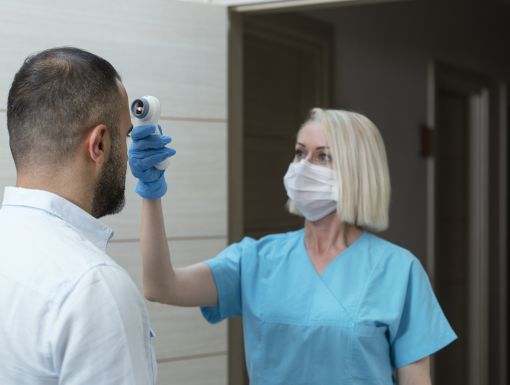
How Contact Tracing Can Slow the Spread of Coronavirus
As states start to loosen their stay-at-home orders, it is important that we continue to follow social distancing protocols and find ways to help limit the spread of COVID-19. In addition to continuing to follow social distancing and proper hand hygiene protocols, it is important that communities utilize contact tracing to help control the rapid community spread of COVID-19. Here are some facts you should know about contact tracing so you can help public health officials if you are ever exposed to COVID-19:
What is contact tracing?
Contact tracing is a disease control measure that has been utilized by local and state health departments for decades. It is a protocol that helps support patients with suspected or confirmed infection, including COVID-19. In contact tracing, public health staff work with the infected patient and help them recall other people they encountered during the timeframe when they may have been infected. Public health staff then contact those people and inform them of the potential risk as quickly and sensitively as possible. To protect the identity of the infected patient, exposed people are not told the identity of the patient who may have exposed them it is all confidential.
Who is considered a close contact?
According to the CDC, a close contact is someone who was within 6 feet of an infected person for at least 15 minutes starting from 48 hours before illness onset until the time the source patient is isolated. They should stay home, maintain social distancing, and self-monitor until 14 days from the last date of exposure.
Timing is everything
For contact tracing to be effective, exposed people need to be contacted in a timely manner. The quicker they are notified, the sooner they can go in self-isolation and can help decrease the further spread of the infection. If people are not notified, rapid community transition will continue. To help with the process, it is important that exposed people recall everyone that they have been in contact with during the infectious period. This is where social distancing helps. The more you social distance yourself from others, the lower your contact number will be.
Another way to help with this process, is by keeping a very broad account of your daily activities. This can be as simple as “I went to the park and dropped off food at my parents’ house” and listing a date. Then, if you are ever exposed, you can easily recall who you may have been in contact with.
Through contact tracing, I’ve been told I’ve been exposed. Now what?
If you have been notified that you have been exposed, public health staff will provide you with education, information and support to help you understand your risk, what you should do to separate yourself from others who are not exposed, how to monitor yourself for illness, and discuss the possibility that you could spread the infection to others even if you do not feel ill.
Contacts are also encouraged to stay at home and social distance yourself for 14 days. In those 14 days, you should monitor your health by checking your temperature twice daily and watching for other symptoms, such as shortness of breath and coughing. If you start to experience any symptoms, contact your medical provider to see if you need to visit them in-person.
For the latest information on COVID-19, visit ochsner.org/coronavirus
The information in this blog post is accurate at the time of publication. However, as the situation surrounding COVID-19 continues to change, it's possible that information has changed since being published. While Ochsner Health is trying to keep our blog posts as up-to-date as possible, we also encourage readers to stay informed on news and recommendations by using the CDC website.

